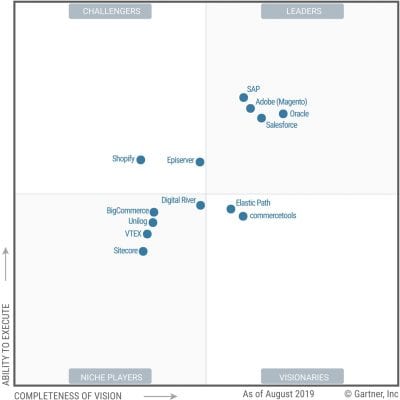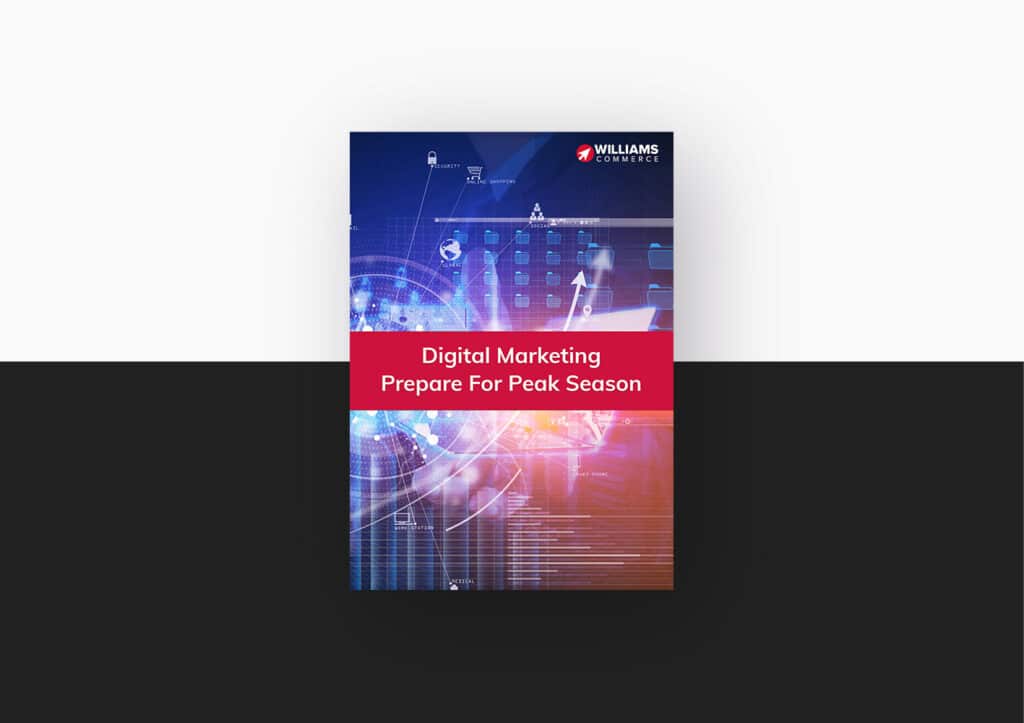The capabilities of your ecommerce platform plays a major role in how well you can serve your online customers.
So as an online retailer, fewer business decisions are more important than selecting the ecommerce platform that underlies your website.
This decision is also of major importance from an operational standpoint. How effectively and successfully an ecommerce site can be managed and operated correlates with the level of service you are able to provide your online customer base with.
But with so many ecommerce platforms out there to choose from, it can be a tricky task selecting and implementing the ideal platform for your business requirements.
Sometimes it can be good to take stock of what’s out there. That’s exactly what Gartner’s recent Magic Quadrant for Digital Commerce report has done.
As a platform-agnostic provider of leading ecommerce solutions, we read this report with great interest here at Williams Commerce.
One thing that rings true is the changing face of ecommerce generally, with new trends and ways of buying starting to be delivered by providers, and therefore explored and adopted by customers.
We’ve picked out some of the main talking points from the report, the highlighted strengths of some providers, and what that can mean for you business in our latest blog.
Key findings
Gartner’s report starts with a series of predictions around ecommerce moving forwards. These include the prediction that by 2023:
– 5% of digital consumer purchases will start with from a voice-enabled commerce interface.
– 75% of organisations selling directly to consumers will offer subscription services, but just 20% will succeed in increasing customer retention.
– 80% of organisations using artificial intelligence in the ecommerce space will achieve an improvement of 25% or more across customer satisfaction, revenue or cost reduction.
Gartner states that moving forwards, ecommerce platforms must have an out-of-the-box capability, or APIs that enable self-service, interactive commerce for customers, in order to remain competitive. They state this should cover storefront, product catalogue navigation, product pages, shopping cart, checkout and a customer account functionality.

Gartner also produced this graphic that helps separate the major ecommerce providers into different brackets, providing an objective view of how the land lies at present. This ranks providers based on factors including their ability to execute, and the completeness of their vision as an ecommerce platform supplier.
Being the platform-agnostic provider we are, it was great to see some of our partners listed in this important research.
The Leaders
Four providers were listed as leading ecommerce suppliers – SAP, Adobe (Magento), Salesforce and Oracle.
We were particularly keen to read of the strengths of both Adobe (Magento) and Salesforce, with whom we have strong partnerships.
Highlighted strengths of Adobe and Magento’s offering include the fact it is a complete commerce solution. The native page builder is core to the commerce platform itself, while solutions that support order management, data and analytics, and shipping are also central.
The Magento Marketplace was highlighted as a particular positive. With more than 4,800 extensions available to third-party commerce applications that can be directly accessed from the Magento admin UI, there is a wealth of choice for adopters.
The acquisition of Magento by Adobe also helps provide businesses with a wider selection of Adobe solutions covering marketing and analytics. This is an advancement on what was available pre-acquisition from Magento.
Meanwhile, Salesforce’s partner network came in for praise and is something we are proud to be a part of.
Salesforce’s application ecosystem was similarly heralded. This contains more than 250 partner applications.
Salesforce was also highlighted for its B2B strengths, as well as its viability. This is based on strong strategy and leadership, as well as increasing revenue and financial strength.
The Challengers
Shopify was listed as a challenger by Gartner, helping to shake up the status quo and challenge the leading players.
Shopify was complimented for its ease of use. No-code configuration makes things simple for business users, helping them keep things ticking over on their ecommerce website without the need for the involvement of IT teams.
Cost was another major strength of Shopify’s offering, with price points way lower than many other ecommerce providers.
What’s more, in excess of 20 channels can be integrated with Shopify Plus, including Amazon, eBay, Facebook and Instagram. Those channels can be easily managed alongside the main ecommerce site – all within a single console.

The Niche Players
Niche players in the ecommerce space are those that offer something different, something with specific appeal to online businesses.
Listed among this group by Gartner was BigCommerce, who deliver a multitenant SaaS platform for businesses of various sizes.
Strengths of the BigCommerce offering highlighted by Gartner included wide functionality for B2C retailers at affordable price points.
Seamless integration with marketplaces such as Amazon, as well as being able to sell easily on social media channels such as Instagram and Facebook, makes BigCommerce a great option for start-ups and SMBs.
BigCommerce also offers a vast partner network (including ourselves), flexible APIs and webhooks that aim to make customer integrations easier.
An additional niche benefit of BigCommerce’s offering is the flexible technology it can support thanks to a modernised platform architecture. This has led to the decoupling of the presentation layer from the commerce engine, which means 90% of the BigCommerce platform is exposed via APIs.
There are also CMS plug-ins and connectors, including WordPress, Drupal and Sitecore. This allows BigCommerce to truly compete with headless commerce vendors.
Picking a platform
Our platform-agnostic structure means that the Williams Commerce team is fully aware of the strengths and drawbacks of the various ecommerce platforms we have available.
We can therefore rationally and logically help guide businesses towards the right ecommerce platform for their size, industry and specific requirements.
We are a Magento Enterprise Solution partner, a Shopify Plus agency partner and a BigCommerce Strategic Partner.
This means not only do we have the expertise to help businesses embrace and thrive with the best ecommerce platform for them, but we are also at the cutting edge of what these providers can offer.
By working closely with these providers, we are able to continue to provide our customers with the latest capabilities and solutions.
As well as the providers outlined here, we also have partnerships with the likes of Shopware, as well as having our own ecommerce platform – Cloudfy. We wouldn’t be surprised at all if these soon penetrate into Gartner’s reports moving forward. This is why:

Shopware
Shopware is renowned for its flexibility and is often the choice of mid-sized B2B businesses and B2C retailers.
The combination of a strong feature list and multiple high-quality plugins and extensions means businesses operating their ecommerce website on the Shopware platform can tailor things to their specific requirements, aims and customer needs with ease.
There’s also a host of integration options for ERP platforms, as well as custom integration with the Shopware platform itself. This availability and flexibility allows businesses to make the very most of the full Shopware offering.
Shopware uses a high-end software architecture that puts PHP 7, Elasticsearch and the power of an open API in the hands of users.
Shopware is also a great ecommerce option because it is completely open source, and works on an open template basis. That means that if customisation is a real priority, Shopware can make for a great fit.
Williams Commerce is a Shopware Certified Agency, with a team of Shopware Certified developers ready to help businesses embrace this ecommerce platform to the fullest extent.
Cloudfy
There’s a lot of great ecommerce platforms out there, as this article evidences.
So a few years ago, we thought ‘why not throw one more into the mix?’
Enter Cloudfy. This ecommerce platform is perfect for B2B businesses looking to trade online, while integrating data around orders, product, pricing and stock into your back end systems.
Simplicity is a priority with Cloudfy. It’s available as a monthly subscription, and the Cloudfy team are always looking to make updates and enhancements to what it offers.
If you’re a B2B business looking to take advantage of low cost but high-quality ecommerce capabilities, from a platform that scales on demand and offers lightning-fast performance, Cloudfy can be the perfect fit.




